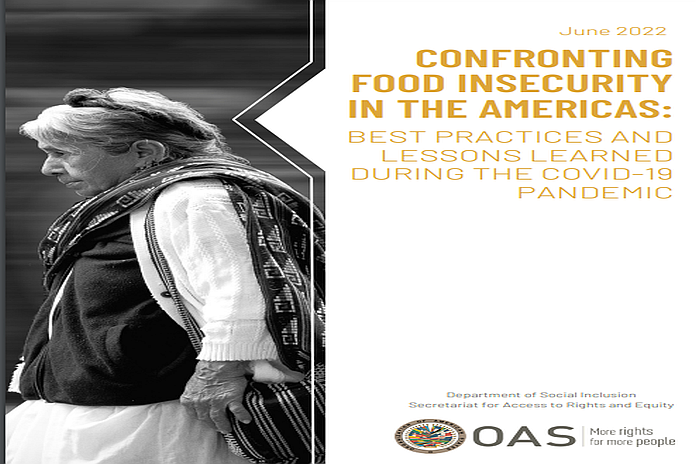WASHINGTON, USA – The Organization of American States (OAS) presents the report “Confronting Food Insecurity in the Americas: Good Practices and Lessons Learned during the Covid-19 Pandemic,” which systematizes information from 16 countries on policies and programs to ensure food security in the region and identifies priority lines of action on this issue.
Food insecurity is on the rise in several countries around the world, reversing years of progress and jeopardizing the ability to achieve the Sustainable Development Goals, specifically the goal to “End hunger, achieve food security and improved nutrition and promote sustainable agriculture.” The combination of the onset of the COVID-19 pandemic with declining incomes and disruptions in food supply networks and distribution chains have led to a significant increase in chronic and acute hunger.
In Latin America and the Caribbean in 2020, 41 percent of people were moderately or severely food insecure, and 14 percent experienced extreme food insecurity, defined as having no food and going a day or more without eating, according to data from the Food and Agriculture Organization of the United Nations (FAO). The number of people lacking physical or economic access to a quantity and quality of food necessary for health and development increased to 267 million people in 2020, an increase of 60 million people from the previous year. Food insecurity disproportionately affects groups that are already in a situation of greater vulnerability, such as women, indigenous and Afro-descendant peoples, people with disabilities, the elderly, people in a situation of human mobility, among others.
“We hope that this report will be of the greatest use to Member States in combating this scourge,” said Betilde Muñoz-Pogossian, Director of the Department of Social Inclusion of the OAS Secretariat for Access to Rights and Equity, which prepared this report. “Sharing this information at the regional level is of great importance to guide countries in their actions to expand and improve their efforts towards food security in the Americas,” she added.
The report was an essential input to the joint session of the OAS Permanent Council with the Inter-American Council for Integral Development (CIDI) on June 21 whose purpose was to address and promote viable actions and regional cooperation to strengthen food security in a comprehensive and sustainable manner as a fundamental strategy to address persistent social and economic needs in the Americas, including those emerging from the COVID-19 pandemic.
This report is one of the actions adopted by the OAS as a follow-up to the declaration adopted at the OAS General Assembly in 2021, “Renewed Commitment to Post-COVID-19 Sustainable Development in the Americas” which highlights the “commitment to continue promoting national and regional measures to respond to the multiple crises that have unfolded, addressing the structural causes, particularly to counteract the effects of climate change and biodiversity loss, as well as discrimination, hunger and food and nutrition insecurity, displacement, poverty and violence”. The OAS remains at the disposal of Member States to continue to promote effective measures to eradicate hunger throughout the region.





